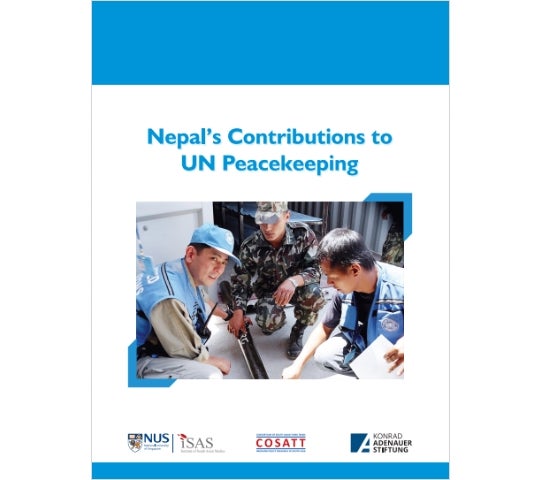
| Title: | Nepal’s Contributions to UN Peacekeeping |
| Author/s: | Consortium of South Asia Think Tanks, Institute of South Asian Studies, Konrad Adenauer Stiftung |
| Abstract: | In tandem with United Nations (UN) peackeeping, Nepali contributions to global security have changed and turned increasingly complex in the last two decades, with hybrid conflicts increasing and insurgents in various theatres now using sophisticated weapons and communication devices unavailable to peacekeepers. Nepali peacekeepers have nevertheless undertaken such challenges and been commended by the international community. However, their contributions to UN peace building efforts across the world have been subject to little critical analysis.
This Special Report assesses Nepal’s participation in UN peacekeeping missions from three broad perspectives: international relations, international security and domestic politics. It is the outcome of a hybrid workshop on ‘Nepal’s Contribution to UN Peacekeeping’, organised by the Consortium of South Asian Think Tanks, Institute of South Asian Studies and Konrad Adenauer Stiftung on 19 April 2021. |
| Date: | 27 December 2021 |
| DOI: | 10.48561/d2xd-a5j9 |
| Read More |
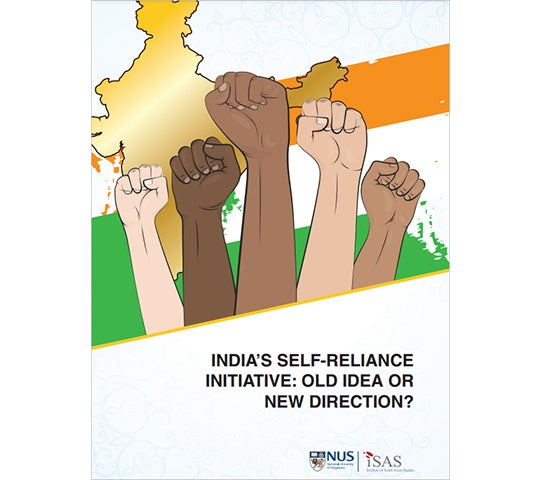
| Title: | India’s Self-Reliance Initiative: Old Idea or New Direction |
| Author/s: | Ronojoy Sen, Vani Swarupa Murali |
| Abstract: | In May 2020, Indian Prime Minister Narendra Modi launched the AatmaNirbhar Bharat Abhiyaan (Self-Reliant India) campaign to help the country overcome the challenges posed by the COVID-19 pandemic. It was also meant to build a stronger economy that could withstand global competition. The prime minister also stated that a self-reliant India would stand on five pillars – the economy, infrastructure, a technology-driven system, vibrant demography and demand. The campaign, however, received mixed response with fears of India returning to the pre-liberalisation era and protectionist policies on one hand, and shifting the focus to local industry and indigenous modes of production akin to the idea of Swadeshi on the other.
The Institute of South Asian Studies at the National University of Singapore organised a roundtable on ‘India’s Self-Reliance Initiative: Old Idea or New Direction?’ on 10 December 2020. The event brought together academics and policymakers to discuss key themes about the AatmaNirbhar Bharat campaign. Among others, they discussed various aspects of the campaign through several historical, ideological, social, political and economic lenses. |
| Date: | 28 October 2021 |
| DOI: | 10.48561/tps3-ttga |
| Read More |
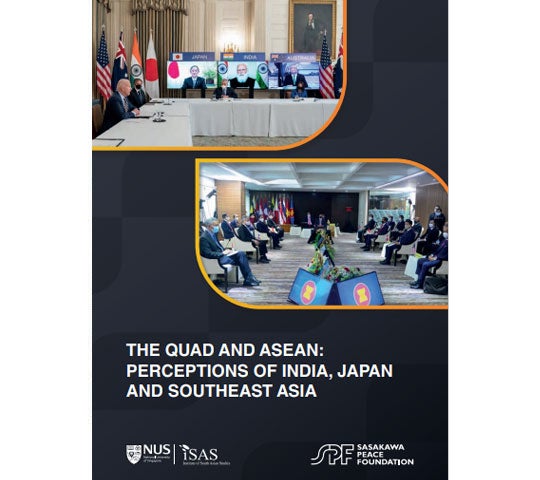
| Title: | The Quad and ASEAN: Perceptions of India, Japan and Southeast Asia |
| Author/s: | Yogesh Joshi, Ippeita Nishida, Nishant Rajeev |
| Abstract: | After the end of the Cold War, the Association of Southeast Asian Nations (ASEAN) emerged as the fulcrum around which the Indo-Pacific’s economic, political and diplomatic interactions took shape.
However, the rise of China stoked apprehensions in the region’s other major powers, such as India and Japan, which are now actively collaborating with the United States (US) to arrest China’s territorial assertiveness and diplomatic coercion. The emergence of the Quadrilateral Security Dialogue (Quad) as a new security institution in the region has grave consequences for ASEAN’s otherwise central role in the region’s geopolitics. Though both Japan and India constantly reaffirm ASEAN’s central role in shaping the region’s future, ASEAN’s divided loyalties between China and the US pose significant challenges to its credibility. In analysing the perceptions of India and Japan on ASEAN and the Quad as well as ASEAN’s perception on the Quad, this Special Report examines the interactions between the two as regional institutions in the Indo-Pacific and the challenges that arise from their interactions. |
| Date: | 18 October 2021 |
| DOI: | 10.48561/n3rm-zgfe |
| Read More |

| Title: | India, Singapore and the Global Partnership on Artificial Intelligence |
| Author/s: | Karthik Nachiappan, Nishant Rajeev |
| Abstract: | Artificial Intelligence (AI) driven technologies are percolating across society and are being deployed to address gaps in areas like healthcare, education, energy and transportation. To channel and streamline these efforts, several governments across the globe are launching national strategies for widespread AI adoption. While India launched the ‘AI for All’ initiative in 2018, the Singapore government has unveiled its ‘National Artificial Intelligence Strategy’.
To evaluate the various challenges arising out of the deployment of AI and how to leverage these innovations to tackle problems such as the COVID-19 pandemic, the Institute of South Asian Studies at the National University of Singapore and the Ananta Centre, New Delhi, jointly organised a roundtable on ‘India, Singapore and the Global Partnership on Artificial Intelligence’. This report is the outcome of the roundtable discussion. |
| Date: | 9 September 2021 |
| Read More |

| Title: | The Myanmar Coup, Resistance and India’s Response: Fractured Between Words and Deeds |
| Author/s: | Jasnea Sarma, Roshni Kapur |
| Abstract: | On 1 February 2021, Myanmar’s armed forces (Tatmadaw) removed the democratically elected government in a midnight coup prompting a nationwide civil disobedience movement and other widespread protests.
This Special Report provides updates on the military’s actions while also examining India’s response to the coup and the subsequent events. It explores the reasons for India’s position which is fractured between words and deeds, where upholding democracy in Myanmar is encouraged in diplomatic statements issued by its foreign ministry, but the strength of the language is tempered by its decade-long links with the military forged to manange its geopolitical and national interests. |
| Date: | 29 June 2021 |
| Read More |
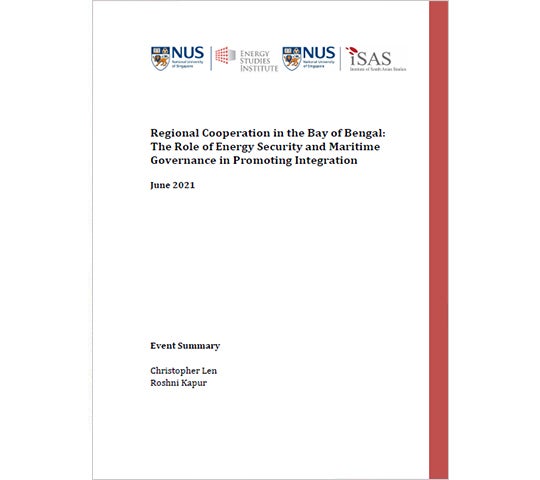
| Title: | Regional Cooperation in the Bay of Bengal: The Role of Energy Security and Maritime Governance in Promoting Integration |
| Author/s: | Christopher Len, Roshni Kapur |
| Abstract: | This policy report is the result of a roundtable organised by the Energy Studies Institute and the Institute of South Asian Studies, both of the National University of Singapore, to explore the role of energy security and maritime governance in promoting regional cooperation in the Bay of Bengal, and in this context, identify the key challenges and opportunities in this emerging subregion.
While transnational and multilateral cooperation requires agreement on certain common goals, the report suggests that for the Bay of Bengal subregion to prosoper, common action points must be found and a target-oriented approach should be adopted. |
| Date: | 29 June 2021 |
| Read More |

| Title: | Regulating Data in India and Indonesia: A Comparative Study |
| Author/s: | Stefan Samse, Aishwarya Natarajan (Konrad Adenauer Stiftung), Karthik Nachiappan, Ronojoy Sen, (Institute of South Asian Studies, National University of Singapore); and Mulya Amri, Dwa Ayu Diah Angendari, Anisa Pratita Kirana Mantovani, Janitra Haryanto and Raka Wicaksana (Center for Digital Society, Universitas Gadjah Mada) |
| Abstract: | This policy report, jointly prepared by the Institute of South Asian Studies, National University of Singapore and Center for Digital Society, Universitas Gadjah Mada for the Konrad Adenauer Stiftung, Rule of Law Programme Asia, Singapore, comprehensively covers how India and Indonesia have sought to regulate data. The booming digital economies of the two countries have created demands to develop legislative frameworks to regulate data – how data is collected, processed, stored and shared.
The report looks at the fragmented landcape for data regulation in these two countries which could soon give way to a comprehensive new law on personal data protection, as well as the challenges concerning the implementation and enforcement of these data laws once enacted. |
| Date: | 28 May 2021 |
| DOI: | 10.48561/95t8-h0we |
| Read More |

| Title: | Institutionalising the Quad: Can it Seize the Momentum for the Future |
| Author/s: | Yogesh Joshi, Ippeita Nishida, Nishant Rajeev |
| Abstract: | Since its resuscitation on the sidelines of the East Asia Summit in 2017, the Quad has moved closer to being a formal grouping. The members – the United States, India, Japan and Australia – have institutionalised an annual foreign ministers’ meeting and, with the invitation of Australia to the 2020 Malabar naval exercises, made the Quad a seemingly organised grouping. The Quad members are slowly building a shared understanding of the need for a rules-based order in the Indo-Pacific with like-minded partners across the globe.
This Special Report, which is the outcome of a roundtable organised by the Institute of South Asian Studies and Sasakawa Peace Foundation, Japan, analyses the process through which the Quad has come this far, enduring the challenges and dilemmas that the member states will face as they move forward. |
| Date: | 27 April 2021 |
| DOI: | 10.48561/4e6k-8nnz |
| Read More |
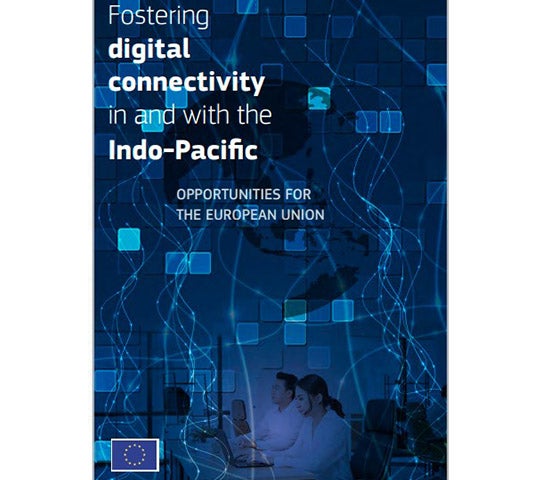
| Title: | Fostering Digital Connectivity in and with the Indo-Pacific: Opportunities for the European Union |
| Author/s: | Brigitte Dekker, Karthik Nachiappan, Maaike Okano-Heijmans |
| Abstract: | As the European Union (EU) embarks on its own distinctive strategic outlook for the Indo-Pacific region, it should contribute to open, safe and inclusive digital connectivity and engage with the region’s thriving digital economies. While the Indo-Pacific countries have called for greater maritime presence by the European countries in their increasingly contested waters, the European actors may have more to offer in the less-discussed but equally contested high-technology and digital domains.
The Netherlands Institute of International Relations Clingendael (or Clingendael Institute) and the Institute of South Asian Studies have brought out a Special Report which assesses tangible steps for the EU to build such partnerships with like-minded partners from the Asia-Europe Meeting to advance digital connectivity in and with the Indo-Pacific region, in line with its principles, approaches and standards on digitalisation. |
| Date: | 22 April 2021 |
| Read More |
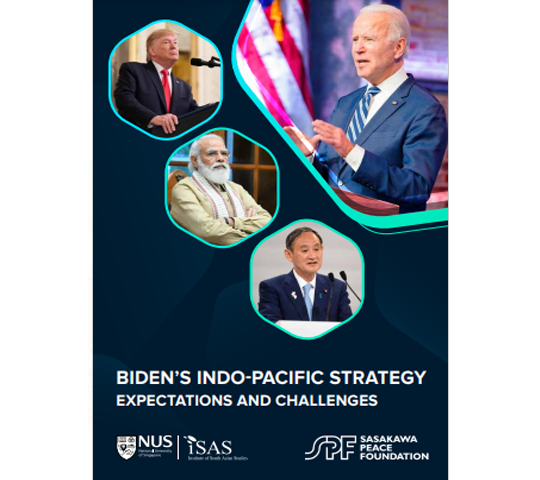
| Title: | Biden’s Indo-Pacific Strategy: Expectations and Challenges |
| Author/s: | Yogesh Joshi, Archana Atmakuri |
| Abstract: | Over the last four years, the Donald Trump administration caused disruptions to the traditional approach of the United States (US) towards its alliances and strategic partners. Even its Indo-Pacific strategy struggled to cope with the transition of power in the region, with China emerging stronger in the aftermath of the COVID-19 pandemic. The new US President Joe Biden will face an uphill task in defining an Indo-Pacific strategy which will not only have to advance the gains made by Trump’s combative approach towards China but also address the pitfalls of his foreign policy.
This Special Report which is the outcome of a round table organised by the Institute of South Asian Studies and Sasakawa Peace Foundation analyses the multiple challenges faced by the Biden administration, including a bitterly divided domestic political scene in the US; an assertive China which is further emboldened by its quick recovery from a global pandemic; allies and partners who fear China’s rising assertiveness on one hand, and possible abandonment by the US on the other; and finally, the smaller nations of Southeast Asia which worry about being entrapped in the ever increasing hostility of the Sino-US Cold War. |
| Date: | 18 February 2021 |
| DOI: | 10.48561/cnz2-jpb9 |
| Read More |
Load more


